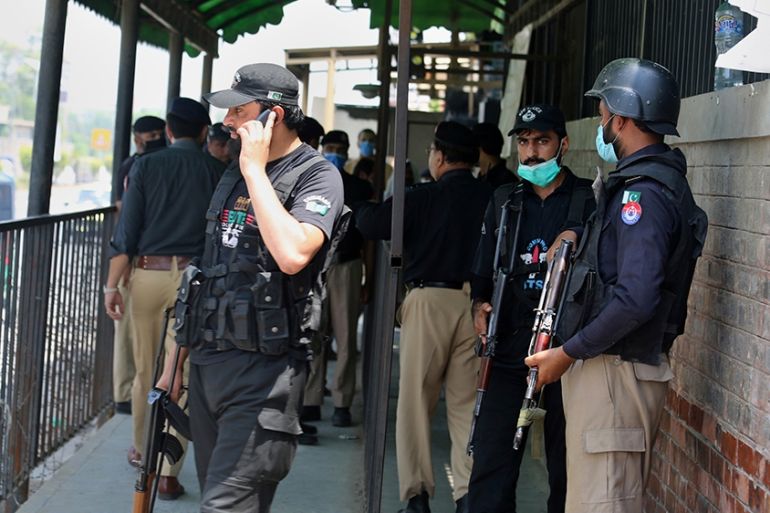Pakistan court acquits Christian couple of ‘blasphemy’
Shagufta Masih and husband Shafqat Emmanuel spent seven years on death row for allegedly sending ‘blasphemous’ text messages.

Islamabad, Pakistan – A Pakistani court has acquitted a Christian couple who have spent seven years on death row for alleged blasphemy, their lawyer says, in a case that rights groups have long singled out for fair trial issues.
The Lahore High Court acquitted Shafqat Emmanuel and his wife Shagufta Masih after a hearing in the eastern city of Lahore on Thursday, the couple’s lawyer Saif ul Malook told Al Jazeera.
Keep reading
list of 4 itemsPakistan PM: Relations with India would be ‘betrayal’ to Kashmir
Pakistani FM: ‘Can the US afford to ignore Pakistan?’
Pakistani journalist assaulted in latest press freedom attack
“They have been acquitted on all charges […] and the capital sentence is set aside,” said Malook.
Ghulam Mustafa Chaudhry, the lawyer for the complainant in the case, confirmed the verdict to Al Jazeera.
“The appeal was allowed after hearing the arguments [from both sides],” said Chaudhry. “The grounds and reasons for the decision have not yet been given.”
Emmanuel and Masih were convicted and sentenced to death in April 2014 for having allegedly sent “blasphemous” text messages that were insulting to Islam’s Prophet Muhammad and its holy book, the Quran, to a local Muslim leader in their native Gojra, a town located 165km (102 miles) west of provincial capital Lahore.
The couple denied the charges, with their lawyer arguing they were illiterate and unable to compose the text messages they were accused of sending, court documents say.
Blasphemy is a sensitive subject in Pakistan, where certain forms of the “crime” carry a mandatory death sentence.
Violence around blasphemy allegations has become increasingly common, with mob violence or targeted attacks against those accused of the “crime” or people who defend them.
Since 1990, at least 78 people have been killed in such attacks, according to an Al Jazeera tally. Those killed include people accused of blasphemy, their lawyers, family members, rights activists and religious leaders.
In 2009, Gojra was the site of some of Pakistan’s worst communal violence, with at least eight Christians killed after a riot by Muslim residents that was trigged by a blasphemy allegation.
‘They will be killed’
On Friday, Malook said the couple were expected to be released from prison within a week, but that they would need security.
“If they are released and are in public, they will be killed,” he said.
Rights groups have echoed that concern, with UK-based Amnesty International demanding that “adequate security” be provided to the couple, their family and Malook.
“‘Blasphemy’ cases are often premised on flimsy evidence in environments that make fair trials impossible, underscoring the significance of this verdict,” said Amnesty’s South Asia Deputy Director Dinushika Dissanayake.
“This case is sadly emblematic of the harassment, intimidation and attacks that those accused of ‘blasphemy’ routinely face and highlights the urgent need to repeal the law.”
Malook also represented Aasia Bibi, a young Christian woman who spent nine years on death row before her acquittal in 2018 in Pakistan’s highest profile blasphemy case.
In 2011, Malook represented the state as a prosecutor in a case against Mumtaz Qadri, a police bodyguard who shot dead Salman Taseer, a provincial governor who had publicly defended Aasia Bibi.
Qadri’s murder of Taseer was hailed by many across Pakistan, with widespread public demonstrations in his support.
The movement that followed saw the formation in 2017 of the Tehreek-e-Labbaik Pakistan (TLP), a political party led by hardline Muslim leaders who call for those who “blaspheme” against Islam to be put to death.
Qadri was hanged in February 2016, after the Supreme Court upheld his conviction.
“They say that you have taken our leader Mumtaz Qadri, you have allowed Aasia to escape and now you have taken Shafqat and Shagufta from us as well,” Malook told Al Jazeera, saying he feared for his life and had been offered no protection by the government so far.
Chaudhry, the lawyer for the complainant in Emmanuel and Masih’s case, however, denied the existence of any threat to either the couple or Malook.
“This is just an atmosphere that they create so that they can get asylum and leave the country,” he said.
Chaudhry said his team was preparing an appeal, to be filed at the Supreme Court, against Thursday’s verdict.
Asad Hashim is Al Jazeera’s digital correspondent in Pakistan. He tweets @AsadHashim.